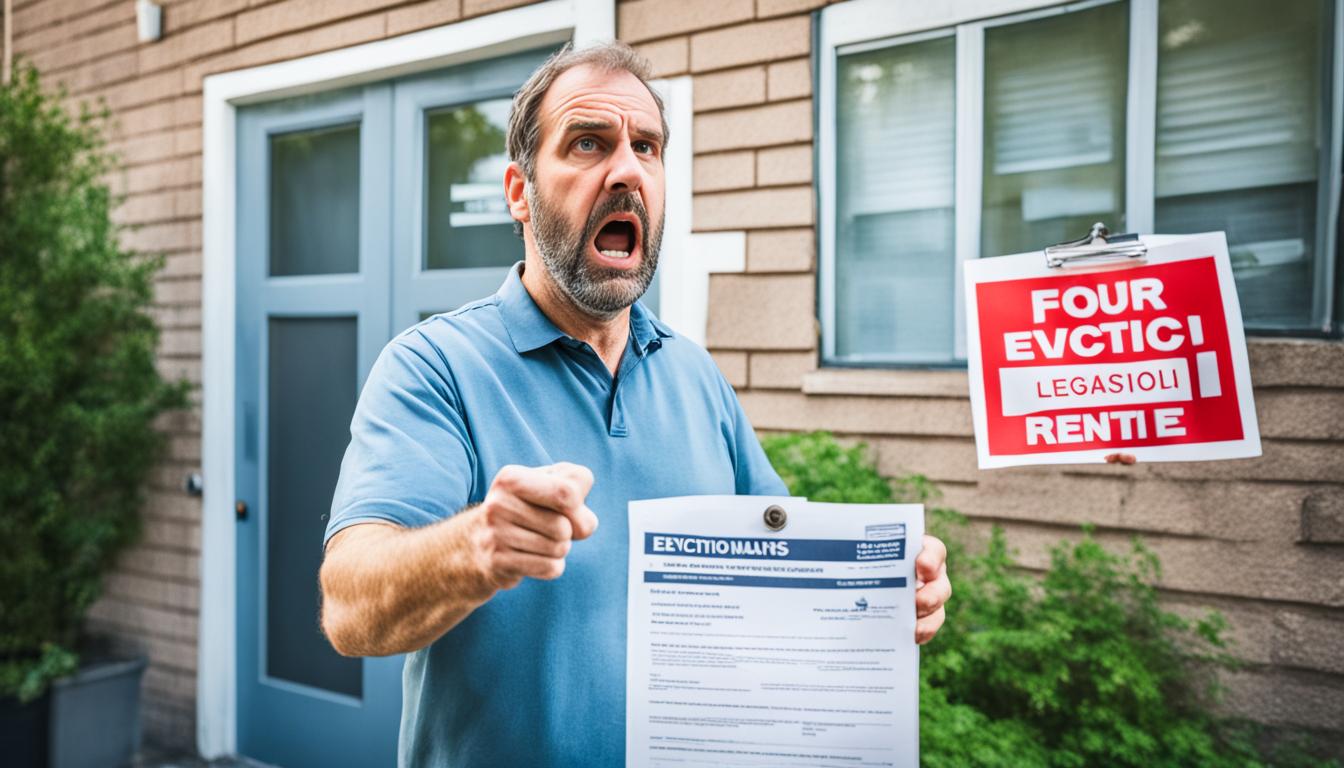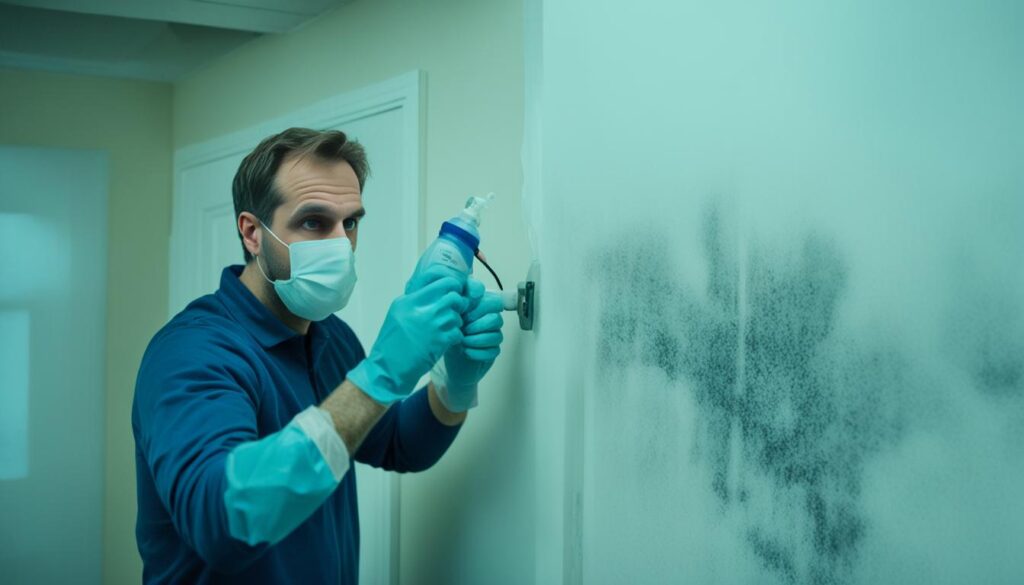
Landlord Rights and Mold: Can Tenants Be Evicted?
When it comes to rental properties, landlords and tenants both have rights and responsibilities to maintain a safe and habitable living environment. One common issue that can arise is mold. But can a landlord actually evict a tenant for having mold? Let’s explore the legal complexities surrounding mold in rental properties and whether landlords have the right to evict tenants due to mold-related issues.
Key Takeaways
- Landlords and tenants both have rights and responsibilities when it comes to mold in rental properties.
- Evicting a tenant specifically due to mold requires establishing legal grounds and adhering to local laws.
- Regular mold inspections and prompt action are important for both landlords and tenants.
- Tenants have the right to a safe and habitable living environment and can take steps to address mold issues.
- The eviction process for mold-related issues involves specific steps and timelines that landlords need to follow.
Understanding Landlord Responsibilities for Mold Prevention
As a landlord, it is essential to understand your responsibilities when it comes to preventing mold in your rental properties. Mold can have detrimental effects on the health of your tenants and lead to potential eviction proceedings if not addressed promptly and effectively.
Regular Mold Inspections: A Vital Responsibility
One of the primary responsibilities landlords have is conducting regular mold inspections in their rental properties. These inspections serve multiple purposes:
- Identifying the presence of mold: Inspections can help detect mold growth at an early stage, allowing for timely remediation to prevent further damage.
- Evaluating the cause of mold: Inspections help determine the underlying causes of mold infestations, such as plumbing leaks, inadequate ventilation, or excess moisture.
- Ensuring a safe and habitable environment: Regular inspections demonstrate a commitment to providing a safe living environment for your tenants, minimizing the risk of mold-related health issues.
By prioritizing mold inspections, landlords can proactively address the potential risks associated with mold and prevent its spread within their rental properties.
The Implications for Eviction Proceedings
Mold infestations can create serious health hazards for tenants and may result in legal action, including eviction proceedings. Landlords who neglect their responsibilities for mold prevention risk facing legal consequences.
When it comes to eviction proceedings related to mold, it is crucial for landlords to demonstrate:
- Prompt response to mold issues reported by tenants
- Efforts to mitigate the mold, addressing its root cause
- Compliance with local laws and regulations regarding mold presence in rental properties
By fulfilling their responsibilities for mold prevention, landlords not only safeguard the wellbeing of their tenants but also protect themselves from potential legal disputes and eviction proceedings.

| Landlord Responsibilities for Mold Prevention | Implications for Eviction Proceedings |
|---|---|
| Conduct regular mold inspections in rental properties | Demonstrate prompt response to mold issues reported by tenants |
| Address underlying causes of mold infestations | Efforts to mitigate the mold, addressing its root cause |
| Ensure a safe and habitable environment | Compliance with local laws and regulations regarding mold presence in rental properties |
By fulfilling their responsibilities for mold prevention, landlords not only safeguard the wellbeing of their tenants but also protect themselves from potential legal disputes and eviction proceedings.
Tenant Rights and Mold: What Protections Exist?
When it comes to dealing with mold issues in rented homes, tenants have certain rights and protections. It is essential for both tenants and landlords to understand these rights to ensure a safe and habitable living environment. In this section, we will explore the specific rights that tenants possess in relation to mold problems and the steps they can take to address such issues.
The Tenant’s Right to a Safe and Habitable Living Environment
Tenants have the right to a safe and habitable living environment, which includes protection against mold and other hazardous conditions. Landlords are obligated to provide a rental property that is free from health hazards, including mold infestations. If mold is present in the property and poses a threat to the tenant’s health and safety, it is the landlord’s responsibility to take appropriate action to address the issue.
In some cases, tenants may be able to request mold removal or remediation from their landlord. However, it is important to note that the specific rights and obligations regarding mold removal can vary depending on local laws and regulations.
Steps Tenants Can Take If Mold Becomes a Problem
If a tenant discovers mold in their rented home, it is crucial to take prompt action to prevent further damage and protect their health. Here are some steps that tenants can consider:
- Notify the Landlord: As soon as mold is discovered, tenants should notify their landlord or property management company in writing. It is recommended to document the issue and provide any relevant evidence, such as photographs, to support the complaint.
- Request Mold Remediation: Tenants can request that the landlord or property owner addresses the mold issue by arranging for professional mold remediation. This typically involves hiring qualified professionals to remove the mold and eliminate the source of moisture that caused the infestation.
- Refer to Local Laws and Regulations: Familiarize yourself with the local laws and regulations regarding mold in rental properties. Depending on the jurisdiction, there may be specific procedures and requirements that landlords must follow when it comes to addressing mold-related issues.
It is important for tenants to communicate their concerns about mold promptly and clearly. If the landlord fails to address the mold problem or takes insufficient action, tenants may consider seeking further assistance, such as contacting local health authorities or consulting with an attorney who specializes in renter’s rights.
Remember, understanding your rights as a tenant and taking appropriate action can help ensure a safe and healthy living environment, free from mold-related concerns.

Legal Grounds for Evicting a Tenant Due to Mold
Mold presence in rental properties can pose serious health risks and damage the structural integrity of the building. As a landlord, it is essential to address mold issues promptly and take appropriate action to protect the well-being of your tenants. In some cases, eviction may be necessary if the tenant’s conduct or negligence contributes to the mold infestation. However, it is crucial to understand the legal grounds on which a tenant can be evicted due to mold, as the process must comply with applicable laws and regulations.
One key aspect in evicting a tenant due to mold is establishing evidence that the tenant’s actions or omissions have caused or exacerbated the mold problem. This requires thorough documentation, including reports from professional mold inspectors and any relevant maintenance requests or communications regarding the mold issue. The documentation should clearly demonstrate the tenant’s responsibility for the mold growth, such as failure to notify the landlord of leaks, inadequate ventilation practices, or neglecting to maintain proper cleanliness.
Additionally, it is important to adhere to specific notice periods and procedures outlined in local laws. Each jurisdiction may have different requirements for evicting a tenant due to mold, including the duration of notice given to the tenant, the opportunity to rectify the issue, and the steps to follow if the tenant fails to comply. Familiarize yourself with your state and local laws regarding mold presence eviction notice to ensure you are acting within the legal framework.
Quote: “When considering eviction due to mold, it’s crucial to gather substantial evidence supporting the tenant’s contribution to the mold infestation and adhere to local laws to avoid potential legal complications.” – Jane Smith, Real Estate Attorney
Evicting a tenant due to mold should not be taken lightly, as it involves legal and ethical considerations. To protect yourself from potential legal challenges, it is advisable to consult with a qualified attorney who specializes in landlord-tenant laws and mold-related cases. They can provide guidance on navigating the eviction process while ensuring compliance with all necessary legal requirements.
To summarize, landlords have the legal grounds to evict a tenant due to mold if they can demonstrate the tenant’s responsibility for the mold infestation through proper documentation and evidence. Adhering to local laws regarding notice periods and eviction procedures is crucial to avoid legal complications. Consulting with an attorney well-versed in landlord-tenant laws can provide invaluable guidance throughout the process.
The Mold Eviction Process: What Landlords Need to Know
When faced with a mold infestation in a rental property, landlords may find themselves in the difficult position of having to evict their tenants. While eviction should always be a last resort, it is essential for landlords to understand the process involved and the necessary steps to follow when mold becomes a serious issue.
Evicting a tenant due to a mold infestation requires careful adherence to legal procedures and documentation. Landlords must establish clear and valid reasons for eviction, ensuring they have proper evidence of the mold problem and its impact on the property’s habitability.
To initiate the eviction process, landlords typically start by giving the tenant a written notice of the violation. This notice should outline the specific mold-related issues and provide a reasonable period for the tenant to rectify the problem or vacate the premises. It’s crucial to be aware of the specific notice requirements and timelines mandated by local laws.
“As a landlord, it’s essential to ensure that you are compliant with local laws and regulations regarding mold infestations and evictions. Keep detailed records of the mold-related issues, including any inspections, communication with tenants, and remediation efforts. This documentation will be invaluable if the eviction process proceeds to court,” advises Lisa Anderson, a real estate attorney.
If the tenant fails to address the mold issue within the specified timeframe or refuses to vacate the property, landlords may need to proceed with filing an eviction lawsuit. This legal action aims to regain possession of the rental unit and seek any outstanding rent or damages.
The eviction lawsuit typically involves filing a complaint with the appropriate court. Landlords must follow the court’s procedures and timelines, allowing the tenant an opportunity to respond and present their side of the case.
It’s worth noting that the eviction process can be complex and time-consuming. Landlords should consult with legal professionals experienced in landlord-tenant law to ensure compliance with local regulations and increase the likelihood of a successful eviction.
Once the court has made a decision in favor of eviction, landlords need to follow the prescribed procedures for removing the tenant from the property. This often involves obtaining a writ of possession, which authorizes law enforcement to physically remove the tenant if necessary.
Throughout the mold eviction process, landlords must prioritize the health and safety of their tenants. While eviction may be justified in severe cases of mold infestation, it’s crucial to take preventive measures, such as addressing underlying moisture issues and conducting regular mold inspections.
By understanding the mold eviction process and fulfilling their legal obligations, landlords can protect their properties and ensure a safe living environment for their tenants.
Conclusion
In conclusion, this article has explored the complexities surrounding the question “Can a landlord evict a tenant for having mold?” It is important for both landlords and tenants to understand their rights and responsibilities when it comes to dealing with mold issues in rental properties.
While eviction may not always be the immediate solution, it is crucial for landlords to take prompt action in addressing mold problems to ensure the health and safety of their tenants. Landlords have a legal duty to maintain a safe and habitable living environment, which includes preventing and remedying mold infestations.
Tenants also have rights when it comes to mold-related issues. They have the right to a safe and habitable home, and if mold becomes a problem, they should promptly notify the landlord and give them a reasonable amount of time to address the issue. In some cases, tenants may be able to pursue legal remedies or withhold rent if the landlord fails to take appropriate action.
However, eviction should be considered as a last resort. Both landlords and tenants should strive to address mold problems through open communication and cooperation. Seeking professional help and following proper mold remediation procedures can often resolve the issue without resorting to eviction.




